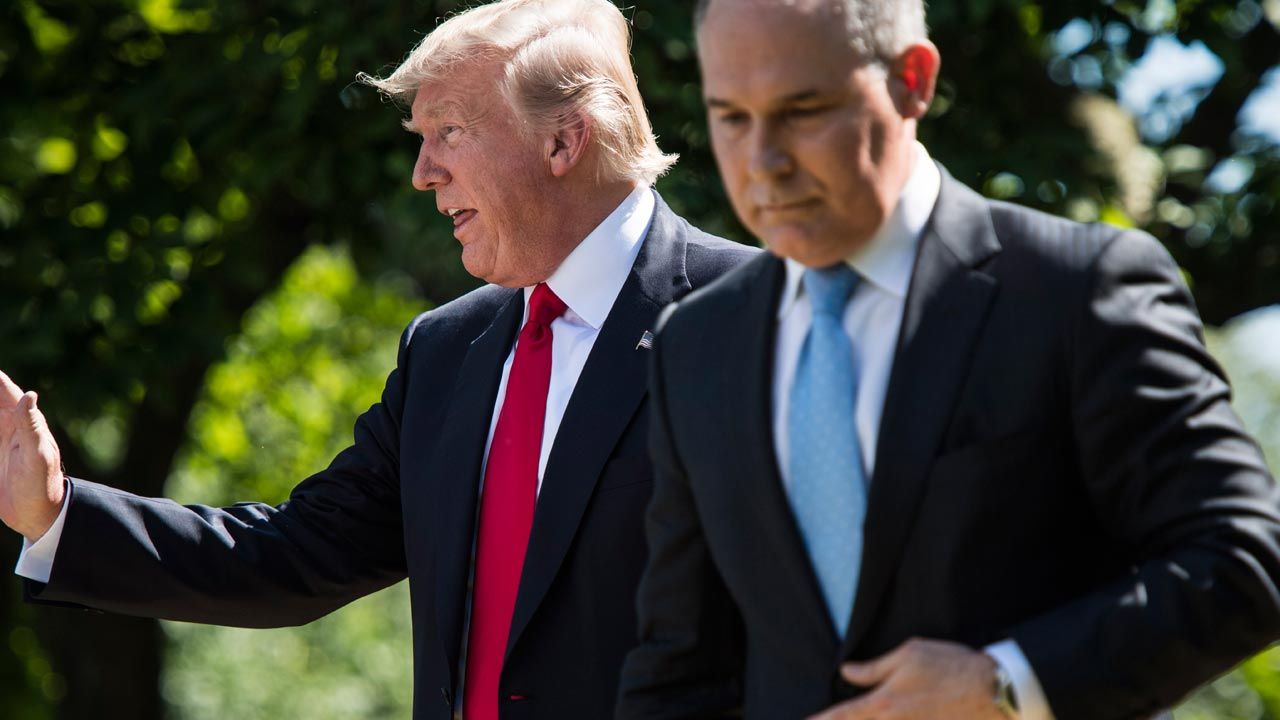
President Donald Trump and EPA administrator Scott Pruitt announce the US withdrawal from the Paris climate change accord in the Rose Garden at the White House on June 1, 2017. (Photo by Jabin Botsford/The Washington Post via Getty Images)
This post originally appeared at Project Syndicate.
President Donald Trump’s withdrawal of the United States from the Paris climate agreement is not just dangerous for the world; it is also sociopathic. Without remorse, Trump is willfully inflicting harm on others. The declaration by Nikki Haley, the US ambassador to the United Nations, that Trump believes in climate change makes matters worse, not better. Trump is knowingly and brazenly jeopardizing the planet.
Trump’s announcement was made with a bully’s bravado. A global agreement that is symmetric in all ways, across all countries of the world, is somehow a trick, he huffed, an anti-American plot. The rest of the world has been “laughing at us.”
These ravings are utterly delusional, deeply cynical or profoundly ignorant. Probably all three. And they should be recognized as such.
After Trump claimed to be representing “Pittsburgh, not Paris,” the mayor of Pittsburgh immediately declared that Trump certainly is not representing his city. In fact, Pittsburgh has made the transition from a polluted, heavy industrial economy to an advanced, clean-tech economy. And it is home to Carnegie Mellon University, one of the world’s great centers of innovation in information technologies that can promote the transition to zero-carbon, high-efficiency, equitable and sustainable growth — or, more simply, an economy that is “smart, fair and sustainable.”
Trump’s announcement was rooted in two profoundly destructive developments. The first is the corruption of the US political system. Trump’s announcement was not really his alone. It reflected the will of the Republican leadership in Congress, including the 22 Republican senators who sent Trump a letter the week before, calling on him to withdraw from the Paris accord.
These senators, and their counterparts in the House of Representatives, are on the take of the oil and gas industry, which spent $100 million on campaign contributions in 2016, of which 90 percent went to Republican candidates. (In fact, the total was almost certainly far above $100 million, but much is untraceable.)
The second destructive development is the twisted mindset of Trump and his closest advisers. Their view, defended with “alternative facts” that have no basis in reality, is paranoid and malevolent, aimed at inflicting harm on others or at best indifferent to harm befalling others. “The Paris agreement,” rants Trump, “handicaps the United States economy in order to win praise from the very foreign capitals and global activists that have long sought to gain wealth at our country’s expense.”
This is nuts. The Paris accord is a universal agreement among 193 UN member states to cooperate in decarbonizing the world’s energy system and thereby head off the dangers of climate disaster, such as a multimeter sea-level rise, extreme storms, massive droughts and other threats identified by the global scientific community. Some of these threats are already evident in vulnerable parts of the planet.
The Paris climate agreement requires each country is to do its part with “common but differentiated responsibilities.” America’s differentiated responsibilities start with the fact that the US is, by far, the largest cumulative greenhouse-gas emitter in the world. As such, the US has contributed more to ongoing climate change than any other country. And US per capita emissions are higher than in any other large country, by far. The Paris accord does not victimize the US; on the contrary, the US has a world-beating responsibility to get its house in order.
According to data from the World Resources Institute, the US accounted for an astounding 26.6 percent of global greenhouse-gas emissions from 1850 to 2013. America’s population today is just 4.4 percent of the world’s population. In short, it is America, where per capita emissions have always been several times higher than the world average, that owes the world climate justice, not the other way around.
Consider the most recent data for the year 2014 from the International Energy Agency’s Energy Statistics 2016. The world’s CO2 emissions from energy and industry averaged 4.5 tons per person (32.4 billion tons per 7.2 billion people in the IEA tabulation), while US emissions were nearly four times that level, 16.2 tons per person (5.2 billion tons for 320 million people). Trump carries on about the Paris agreement’s supposed bias in favor of India, but fails to acknowledge that India’s per capita emissions are 1.6 tons, just one-tenth of the US level.
Trump also bemoans the US contributions to the Green Climate Fund (and sneers at the name for some reason as well). He complains that the US has already given over $1 billion, without explaining to the American people and the world that $1 billion is a contribution of $3.08 per American. Indeed, the $10 billion expected from the US over many years is a mere $30.80 per American.
Here’s the simple truth: The entire world needs to move quickly and resolutely to a low-carbon energy system, in order to end emissions of CO2 and other greenhouse gases by mid-century. This is not a move against the US. It’s a global imperative — true for the US, China, India, Russia, Saudi Arabia, Canada and other fossil-fuel-rich countries, as well as for fossil-fuel-importing regions such as Europe, Japan and most of Africa. Fortunately, the technologies exist: solar, wind, geothermal, hydroelectric, ocean, nuclear and other low-carbon energy sources.
Here’s more simple truth: With its large, rich, fossil-fuel-intensive economy, the US has done more than any other country to bring about the global peril of climate change, so it should accept its responsibility in helping to get us all out of danger. At a minimum, America should be eagerly cooperating with the rest of the world.
Instead, Trump’s sociopathic behavior, and the corruption and viciousness of those surrounding him, has produced utter disdain for a world nearing the brink of human-made catastrophe. The next human-caused climate disasters should be named Typhoon Donald, Superstorm Ivanka and Megaflood Jared. The world will not forget.




